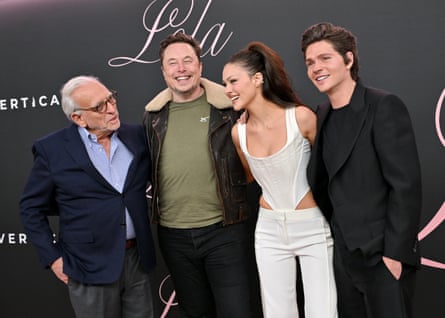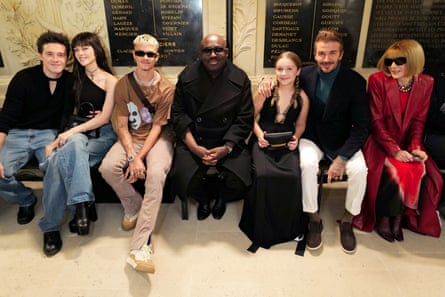If a nepo baby makes a laughably oblique film portraying what she must imagine to be the strife of the impoverished class, but hardly anyone watches it, will it hurt her career?
That’s sort of a trick question. Nicola Peltz Beckham, daughter of the Disney agitator investor and billionaire Nelson Peltz, and daughter-in-law of the power couple David and Victoria Beckham, dwells in a tax stratum so high that her career’s successes and failures are almost irrelevant. Most learned her name when her father filed a lawsuit against two of her former wedding planners over a $159,000 deposit – a relatively small amount in comparison with the reported $3.8m bill for her nuptials to Brooklyn Beckham. She has acted in a handful of television shows and movies since she was 11, but Lola, which premiered on 9 February with a limited theatrical and digital release, marks her writing and directorial debut, and her first leading role. Peltz Beckham described the project, which she’s been working on for six years, as a “slice-of-life film”.
On the whole, Lola is a bad movie.
Peltz Beckham plays Lola James, a 19-year-old who splits her time working at a drugstore with her best friend, Babina, and a strip club, where she’s naive though intrigued by what goes down in the back room. Her tense home life in “middle America” is dominated by her alcoholic mother, Mona (Virginia Madsen), who cruelly ridicules her younger, genderqueer sibling Arlo (the child is referred to with he/him pronouns in the movie), whose affinity for painted nails and makeup is at odds with Mona’s God-fearing Christian values. Lola aspires to send Arlo to art camp in Dallas, which vaguely motivates her to make more money, including servicing creepy customers in the strip club’s back room. After taking refuge at Babina’s house to escape Mona’s wrath, Lola stops back home to pick up the pet bulldog, only to be raped by Mona’s boyfriend, Trick. A few days later, Mona makes Arlo cut his long blond hair, causing him to run away through the streets. He is hit by a car and killed. This perhaps causes Lola to start abusing nose drugs that she buys from Malachi, a pockmarked ex-boyfriend with fluffy hair eager to win her back after cheating on her.

I write “vaguely” and “perhaps” because the plot points hardly feel inciting or interconnected, but rather like trauma bulbs spaced out neatly on a string of lights. Unwilling sex work, scraping by at minimum wage, being abused, losing a sibling violently, abusing drugs – all the bulbs are turned on at once, blinding the moviegoer.
Also, Lola gets pregnant from the rape.
The movie ends with Mona blaming Lola for Arlo’s death, and Lola keeping the baby Trick impregnated her with and raising it with Malachi. In the interim she gets sober through a Narcotics Anonymous group (Peltz Beckham’s brother Will Peltz plays a fellow member, who seemingly flirts with her after a meeting?), confronts her terrible mother, and declares in a concluding narration that this has been a story about generational trauma.
Lola doesn’t even deserve the hate-watch indulgence that Madame Web received. Filled to the brim with underbaked, oftentimes harmful tropes – the supportive Black best friend, a queer child meeting an unceremonious death, the virginal stripper saved by motherhood, a hypocritical Christian drunk – the film leaves one wondering what could have been achieved if any of these characters or their storylines were given as much attention as the gaffers paid to the light hitting Peltz Beckham’s cheekbones.
But, save for a handful of Letterboxd and Google reviews and a WWD interview, very few people have called out Peltz Beckham’s egregious leverage of the aesthetics of poverty, as well as sex work and queer suffering, to serve her creative reputation. The majority of the press surrounding Lola handles the 29-year-old with kid gloves. “You should be so proud of yourself,” an interviewer at the Hollywood Reporter offered. Kelly Clarkson softballed her questions about how fun it must have been to bring her mom and husband on set. Vogue’s coverage of the Lola premiere glossed over the contents of the film and celebrated instead what Peltz Beckham wore (Victoria Beckham’s designs) and how the after-party was decorated (like a strip club).
Peltz Beckham did achieve something with Lola: it’s called “poverty porn”, and in film, that means the exploitation of the conditions of poverty for entertainment and artistic recognition.
Whether a project can be described as “poverty porn” depends on where it falls along the exploration to exploitation spectrum: media that explores poverty doesn’t rely on sensationalism and feels respectful and engaging, while exploitative media might have you wondering if the subjects would sign off on this depiction of themselves.
Ideally, a sincere desire to humanize those living on the margins, to make a character’s appeal transcend the fact that they are poor and all the lazy stereotypes associated with that, helps avoid exploitation. Sean Baker’s vibrant film The Florida Project, about a young mother and daughter living in a motel on the outskirts of Disney World, was mostly successful at that exploration. Then there are films that romanticize notions of class struggle, like the 2021 Oscar winner Nomadland, which contained a scene of an Amazon warehouse lunch break that was so chummy and uncritical of the pitfalls of gig labor that you wonder if Amazon had a financial interest in the movie. (It didn’t, but it did allow the movie to film in its warehouses.) Hillbilly Elegy, the memoir by JD Vance turned Netflix movie, earned itself a more cynical watch after Vance won Ohio’s Senate seat on policies that hurt the population he profited from writing about.
Still, these examples managed to explore nuance in the realities of living without means in this country, whereas Peltz Beckham cosplays a disadvantaged darling, dressed up in despair drag, in a film whose message about hardship could be summed up as “pout your way out of poverty”.
What makes Lola such a flagrant example of poverty porn is just how careless the project feels in the context of Peltz Beckham’s exceptionally lavish life.

That lifestyle was on full display on the Lola red carpet. Peltz Beckham and her co-star and brother Will both shared a photo on Instagram of them posing with their father Nelson and Elon Musk, who attended the premiere. The nearly $200bn net worth pictured, an almost unfathomable amount of money, felt like a mockery of the film’s themes. Further, Musk, who has an estranged trans daughter, joked that he was there “with friends thinking about companies to acquire”, implying the premiere itself served as a great place for the rich to get richer.
It is also worth noting that Nelson has donated to political candidates – Tim Scott, Ted Cruz, Donald Trump – who have supported and authored legislation and campaigned on values endangering trans and gender-nonconforming youth, children who are no different from Lola’s young Arlo. While I’m hesitant to ascribe the sins of anyone’s father to them, Peltz Beckham not only looped her father into promoting the film but is aware of the reputation and company he keeps. In one of the text messages made public in her father’s wedding-planning lawsuit, she demanded, “desantis must be OFF THE GUEST LIST. PLEASE CONFIRM!!” If anyone is looking for a sign of Peltz Beckham’s respect for the characters she’s written, they won’t find it in the photos of her cozying up to Musk and Dad.
While doing press for Lola, Peltz Beckham said she “wanted to write a story from a person’s perspective and another point of view that was not my personal view and not my upbringing. I am an actress and my dream is to get to look at the world from different perspectives.”
That’s fair; telling stories about the impoverished class shouldn’t be off limits to anyone with enough (which is often quite a lot of) money to make a movie. Nepotism isn’t inherently evil nor should billionaire heiresses be barred from creative work (case in point: Julia Louis-Dreyfus). Nevertheless, it is remarkable to witness all that money can buy (a talented cinematographer, Quincy Jones as a music director) put to work within a world dictated by such thin scripting and and careless caricatures.
What all that money can buy includes gratuitous shots of Peltz Beckham as Lola, her mouth slightly agape like a fashion model and makeup done impeccably (exaggerated enough to let us know she’s lower-class, but not so much that it denies her beauty). She stares blankly into the distance at the strip club, or while hugging a toilet after doing drugs at work, or sitting in a back parking lot next to a discarded toy pony. It can’t be overemphasized how often we watch her sitting and staring in this movie; the shots string together the film’s many blinding trauma bulbs. Lola is visually mesmerizing; it also doesn’t add up to much more than a glorified commercial for Peltz Beckham.
A movie like Lola isn’t going to help build a respected career. Though I’m not sure that’s what Peltz Beckham is after. She enjoyed a congratulatory press tour. She looks glamorous in a wife beater. Her finances won’t suffer, and I’m willing to bet she’ll always be in a monetary position to fund her next vanity project. What’s ultimately shameful is that she can wipe off her working-class smokey eye and go about her life, while the people whose perspective she wanted to dip into for a story won’t enjoy any of those luxuries.
Source: theguardian.com





















